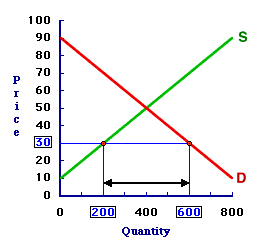
|
|
QUALITY OF LIFE: A common term used to indicate the overall level of well-being or welfare of a person or group of people, taking into account both monetary and non-monetary factors. This notion is theoretically synonymous with utility and the satisfaction of wants and needs. However, from a practical standpoint, attempts have been made to measure the quality of life, primarily as a means of comparison between communities. Quality of life measures are composite indexes based on monetary factors such as income, wages, living costs, and taxes, combined with non-monetary factors such as crime rate, air quality, and education level.
Visit the GLOSS*arama
|
|


|

|
                           EXCESS DEMAND: A disequilibrium condition in a competitive market in which the quantity demanded is greater than the quantity supplied. Excess demand is another way to say shortage. It also goes by the common term of sellers' market. Excess demand is one of two disequilibrium states of the market. The other is excess supply (or surplus). Excess demand emerges in a market when the quantity demanded by the buyers exceeds the quantity supplied by the sellers... at a given market price. Buyers are seeking to buy more of the good than sellers are willing to sell, hence there is an "extra" or "excess" amount of demand.| Excess Demand |  |
Excess demand is illustrated using the market for 8-track tapes displayed in this exhibit. This graph was generated with data from the 88th Annual Trackmania 8-Track Tape Collectors Convention at the Shady Valley Exposition Center.The excess demand for 8-track tapes is indicated as the difference between the quantity demanded and the quantity supplied at a specific market price. In particular, at a 30-cent price, the quantity demanded is 600 tapes and the quantity supplied is 200 tapes. Buyers are willing and able to purchase 400 tapes more than sellers are willing and able to sell. Hence this market has an excess demand of 400 tapes. The result of this excess demand is an increase in the market price. Because buyers are unable to buy as much of the good as they want, they are inclined to bid up the price. Of course, as the price rises, the quantity supplied increases and the quantity demanded decreases, both acting to reduce the amount of the excess demand. Ultimately the entire excess demand is eliminated and equilibrium is restored.

Recommended Citation:EXCESS DEMAND, AmosWEB Encyclonomic WEB*pedia, http://www.AmosWEB.com, AmosWEB LLC, 2000-2025. [Accessed: July 18, 2025].
Check Out These Related Terms... | | | | | | | |
Or For A Little Background... | | | | | | | | | |
And For Further Study... | | | | | | | |
Search Again?
Back to the WEB*pedia
|



|

|
YELLOW CHIPPEROON
[What's This?]
Today, you are likely to spend a great deal of time searching the newspaper want ads trying to buy either a T-shirt commemorating the 2000 Olympics or a genuine fake plastic Tiffany lamp. Be on the lookout for telephone calls from former employers.
Your Complete Scope
This isn't me! What am I?
|

|
|
North Carolina supplied all the domestic gold coined for currency by the U.S. Mint in Philadelphia until 1828.
|

|
|
"A winner is someone who recognizes his God-given talents, works his tail off to develop them into skills, and uses those skills to accomplish his goals. " -- Larry Bird, basketball player
|

|
VIR
Variable Interest Rate
|

|
|
Tell us what you think about AmosWEB. Like what you see? Have suggestions for improvements? Let us know. Click the User Feedback link.
User Feedback
|


|


